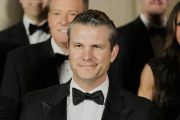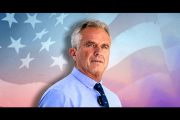
In an interview with Washington, D.C. radio station WMAL, Dr. Paul said that if he should fail to receive his party’s nomination, he hasn’t decided if he will endorse the Republican candidate. When pressed for a reason for his reluctance, Paul, known for his unabashed libertarian leanings, responded that he is not convinced that his colleagues are committed enough to those principles of constitutional liberty that are so dear to him.
Paul eloquently summarized his underlying problem with the GOP establishment thus: “I want us [the Republican Party] to stand for something. We change parties, but we never change policies.”
Regarding the similarities between Democratic and Republican positions on key national issues, Paul asked the interviewer: “Which Republican [presidential candidate], other than myself, would really look into the Federal Reserve’s bailing out of big business, banks, and foreign banks?”
Exposing the fraudulent monetary policies promulgated by the central bank that perpetuates the boom/bust cycle that precipitated the current global economic crisis is one of Ron Paul’s most repeated campaign themes. “Nowhere in the Constitution is there authorization for the creation of a central bank,” he argues. He also believes that the principal reason gas prices are so high is that “[Federal Reserve Chairman Ben] Bernanke keeps printing money.”
Over and over in front of standing-room-only crowds, Ron Paul has pointed out the whys and hows of the role played by the Fed in forcing the nation into the fiscal straits we’re navigating. “Bankers are able to manipulate the money supply,” explained Paul, because we’ve forgotten that the Constitution allows only for “gold and silver as legal tender.” The Founding Fathers suffered the effects of post-war inflation (inspiring the historic phrase "not worth a continental") and thus appreciated the danger of endowing the federal government with the power to print paper money.
Apart from the monetary divergence between himself and many in his party, Paul told the radio interviewer that there is a definite lack of Republican conservatism. He lamented, “The Republican base doesn’t have much concern about civil liberties, the Patriot Act, presidential assassinations, or arrests of citizens by the military.”
On the campaign trail, Dr. Paul repeatedly denounces the federal government’s expenditure of billions of dollars on undeclared and unconstitutional foreign wars. “No war can legally be fought unless it is declared by Congress,” Paul says. He believes that his proposal to cut defense spending will not weaken the military or our national defense.
“Spending money on the military is not the same as spending money on defense,” insists the Air Force veteran. As both Paul and his supporters have asserted (contrary to the claims of his detractors and the other candidates), the military is harmed in myriad ways when America plays the role of a global police force, rather than keeping the men and women of the armed forces at home, ready to defend our country as the Constitution provides.
“Our military wants to defend the country, not go to war,” Paul has maintained.
Regarding his differences with the presumptive nominee, former Massachusetts Governor Mitt Romney, Paul listed three chief areas of major disagreement between himself and Romney: foreign policy, monetary policy, and the budget. “We don’t see eye to eye” on these important issues, Paul said.
Paul is faced with these questions about his opinion of Romney based on the latter’s nomination being all but secured.
Currently, Ron Paul is last in delegate count among the four remaining candidates vying for the GOP presidential nomination. In the WMAL interview, however, Paul stated that in light of the fact that all the delegates have not been counted, he is going to stay in the race.
While admitting that it is unlikely that he can achieve the magic number of 1144 delegates needed to clinch the nomination, he argues that “it is still important to get people talking about important issues” regardless of electoral success or failure.
Moreover, Paul accurately pointed out to the program’s host that he polls better than his GOP competitors in head-to-head polls pitting him against President Barack Obama.
Furthermore, Paul’s legions of loyal supporters argue that when the final results are tallied, their man will be found much higher in the delegate count than is regularly reported by the news media. They report that Dr. Paul is “building a delegate base under the radar of the party establishment by having his followers study the rules in caucus states and outmaneuver the other campaigns to get themselves chosen as delegates.”
Many of the Texas Congressman’s most ardent backers have initiated a grass-roots effort aimed at convincing Paul to carry on toward the White House, but as a third-party candidate. Specifically, a group called Grassroots for Liberty has created a website to gather support for its petition to Paul to abandon the Republican Party that has little devotion to the constitutional principles that distinguish Paul from many in his party.
There is precedent for such a switch, of course. In 1988, Ron Paul ran for President as the nominee of the Libertarian Party.
The website contains the following plea: “Please run on a third party ticket until Nov. 6, 2012, to be the next president of the United States of America and to ensure you'll have the biggest stage to spread the message of liberty around the world.”
As of the time of writing this, 311 people have signed the petition. That leaves a long row to hoe for Grassroots for Liberty if they are to reach their stated goal of 100,000 signatures. Despite the slow start, the campaign to convince Paul to run as a third-party candidate has attracted the attention of “prominent libertarians Lew Rockwell and Justin Raimondo.”
The primaries held Tuesday in Wisconsin, Maryland, and the District of Columbia resulted in no increase in the delegate count for Ron Paul. According to estimates, Paul has 51 delegates, while Mitt Romney sits atop the leader board with 642.
While the race looks daunting, there is no denying that Ron Paul enjoys a unique status among Republicans with young people and independents. Furthermore, as stated earlier, his national campaign has implemented a strategy to acquire delegates on a state-by-state basis by focusing on understanding state convention rules and using them to his advantage.
Reports are that the strategy is working. Stories from around the country reveal that “county after county and district after district are sending more Ron Paul delegates to State Conventions than any other candidate.” All this is happening in spite of the attempts by some GOP establishment types that control precinct, county, or district conventions to illegally prevent Paul supporters from participating in the delegate nominating process.
When asked by The New American about his views on this apparent electoral interference, Dr. Paul said, “You can have the message, raise the money, you can have the energy, and you can deliver the votes, but if you have any shenanigans behind the scenes it can still come up bad for you.”
He insists that he has no evidence that such fraud has been perpetrated thus far in the 2012 primaries. Paul did add that were he to receive evidence of “blatant fraud” he would pursue legal remedies to right such a wrong.
Photo of Ron Paul: AP Images



